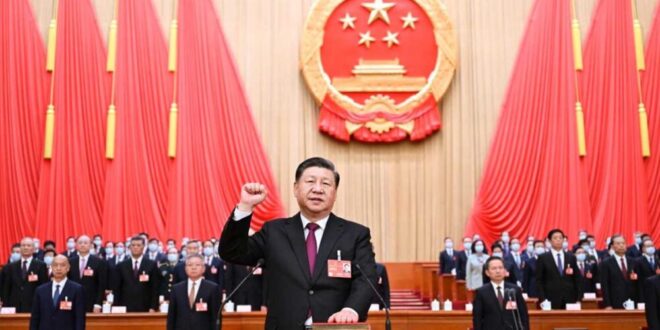Nadia Hilmi
The security issue in China occupied a central position in the foreign policies of the ruling Communist Party, so “security” has become one of the objectives of China’s internal and external policy. It is achieved by following preventive and remedial measures, and China aims behind it to change the surrounding environment internally, regionally and externally. Chinese President Xi Jinping is interested in the concept of “comprehensive national security”, through Beijing’s imposition of a wide range of legislation to protect itself from expected threats, through the laws of (anti-terrorism, counter-espionage, cybersecurity, monitoring foreign non-governmental organizations, and modernizing the national intelligence system and data security). For this reason, China and its ruling Communist Party decided to establish a State Security Commission and improve the system and strategies to ensure China’s national security, according to a statement issued after the conclusion of the (Third Plenary Session of the 18th Central Committee of the Communist Party) directly. There is sensitivity in China towards everything related to national security risks for the Chinese, with a call on all Chinese people to stand with their country in the face of any external interference, so China regularly calls on all its citizens, whether through the media or through posters on buildings, to be careful in facing real or perceived harm risks to China’s national security. Here, China’s state television “CCTV”, in April 2022, Chinese authorities have published graphics asking citizens in China to beware of “potential spies”, especially people who “claim a desire to start a romantic relationship, for example”.
In order to protect China’s national security, Chinese leader Xi Jinping called on the country’s top national security officials to think about worst-case scenarios and modernize security systems. President Xi stressed, during a meeting he held with the National Security Committee of the ruling Communist Party at the end of May 2023, that “the complexity and difficulty of national security issues that the country is now facing, therefore, efforts must be intensified to confront any internal and external threats”. Since President Xi Jinping came to power in 2012, he has made national security a central paradigm in all aspects of governance. President “Xi” has expanded the concept of national security to include everything from politics, economy, defense, culture and the environment to cyberspace, even the deep sea, the polar regions and outer space, as well as big data systems and artificial intelligence.
Here comes the efforts of China and President Xi Jinping towards protecting Chinese interests and their national security abroad, by building a multipolar world and adopting a policy of “economic diplomacy” to enhance China’s soft power around the world and protect China’s national security from any dangers with the assertion that China is a non-imperialist power that seeks to respect the sovereignty of countries on its lands and not to interfere in their affairs. Here, China seeks to gradually become a great power, by controlling its regional environment in East Asia and then expanding globally through giant economic projects through the Chinese Belt and Road Initiative, without competing with the United States of America. Here came the accurate description of the US National Security Adviser Jake Sullivan, for that relationship with China as “big and complex”. At a time when Chinese President Xi Jinping believes that the conditions for preserving China’s national security in the face of US hegemonic and imperialist policies necessitate the necessity of “fully strengthening the process of modernizing the national defense and armed forces, and making the army a great steel wall that effectively protects national sovereignty, security, interests and development”, with the criticism of Chinese leader Xi Jinping of those “external forces” that interfere in Taiwan, led by the United States of America.
Chinese President Xi Jinping also affirmed during his meeting with the Chinese People’s Congress in March 2023, in front of about three thousand deputies gathered in the People’s Palace in Beijing, that “security is the basis for development, while stability is a prerequisite for prosperity”, stressing that The need to strengthen the country’s national security in the face of external challenges. It was the focus of President Xi’s first political speech after winning a new, third, five-year term at the head of the country in March 2023, after a unanimous vote in the Chinese Parliament, by emphasizing the need to strengthen Beijing’s national security in his first speech since assuming the presidency of China for a third term, which came as a culmination of his rise, which made him the country’s most powerful leader in generations, with the warning of the President Xi Jinping at the same time of all the dangers to which China is exposed, in his speech he delivered at the end of the annual session of Parliament in March 2023. Then, the Chinese authorities issued the (Anti-Spying Law on Foreigners) in 2014. And in the first actual and serious application of China’s national security law, especially towards foreigners in China, the Chinese authorities detained a Japanese employee of the “Stellas Pharma” company in Beijing. This is on suspicion of his involvement in espionage, and he is the Japanese No. 17, who has been detained by China, since the issuance of the (Anti-Espionage Law) in 2014.
At the first meeting of the (National Security Committee of the Twentieth Central Committee of the Communist Party of China), chaired by President Xi Jinping, in May 2023, the committee’s leaders affirmed that its mission is to “resolutely protect China’s national sovereignty and preserve the country’s security and development interests, with Comprehensively enhance the country’s national security”. Chinese President Xi Jinping laid out his vision on the national security situation in China, describing it as complex and dangerous, as well as his continuous call for a deeper understanding of the situation and acceleration of the (modernization of the Chinese national security system and capabilities). Therefore, President Xi stressed out of the importance of improving response to immediate monitoring of China’s national security risks, early warning measures in a timely manner, and eliminating threats through a strong set of measures due to the enormity of national security issues facing the country and their exponential increase, as comes the vision of the Chinese President Xi Jinping stress on the need to protect China’s national political security system, improve security governance and artificial intelligence technology.
With regard to the dangers of Chinese national security for the United States of America, President Xi Jinping and the leaders of the ruling Communist Party in China affirmed that military relations between China and the United States are very important, and that contacts and exchanges between the two armies have not been interrupted, despite the strained relations. This is despite China’s rejection of the US proposal to hold a meeting between the defense ministers of the two countries during the (2023 Schengri-La Security Forum in Singapore), due to the US determination to impose sanctions on the Chinese defense minister. With the US side, especially militarily, it must have principles, and the current difficulties facing exchanges between the armies of the two countries originate from the US side itself, which ignores Beijing’s concerns and creates obstacles, which seriously undermines mutual trust.
Here, China called on the American side several times to show its sincerity, correct its mistakes, and create the necessary conditions and atmosphere for communication and exchange between the two sides. A more in-depth look at the US President “Biden’s administration’s view of the world and China”, which determines how the United States will work to “promote its vital interests and strive for a free, open, prosperous, and secure world”. The confirmation of the US national security document in the face of China also came with an emphasis on developing a strategy that takes advantage of the elements of American strength in the face of China mainly, and to overcome strategic competitors, while addressing challenges and forming rules for the road map, and mainly aims to protect the security of the American people, enhance economic opportunities, and defend the democratic values. Here, the American strategy for protecting national security relies on 3 main axes, namely: investing in the basic sources and tools of American power and influence, building the strongest possible coalition of countries to enhance American influence to form the global strategic environment, then modernizing and strengthening the US army so that it is ready for the era of strategic competition.
The Chinese side’s analysis of that US strategy for US national security came to point out to the US side that what America should do is to establish a correct understanding of China, prevent strategic mistakes and the Cold War mentality, abandon the US policy of containment and suppression towards China, and stop engaging in its zero-sum games, return to rationality and pragmatism, and meet China halfway to enhance the stability of Sino-American relations. At the same time, China affirms China’s serious position on the Taiwan issue in a comprehensive manner, considering that the Taiwan issue is the core of China’s core interests, the firm foundation for the political foundation of Sino-American relations, and the first red line that cannot be crossed by the United States of America. China also asked the United States of America to remove unreasonable restrictions and obstacles on people-to-people and cultural exchanges between the two countries, work with the Chinese side to conduct more exchanges between various sectors in the two countries, and enhance mutual understanding between the Chinese and American peoples.
And through the previous understanding of the comprehensive and broad Chinese concept of national security, we conclude that protecting China’s national security focuses intensively on better coordination of security and development, while paying attention to the security aspect of protecting China’s economic interests at the same time. The concept of China’s national security is aimed at effectively building a “favorable external security environment around China”, to better protect openness to the outside world, and to promote deeper integration of development and security, and the need to reform the approach to ensuring national security. Hence China’s most prominent efforts to ensure its national security politically, by improving the security management of Internet data and artificial intelligence and accelerating the establishment of a system for monitoring and early warning of security risks as necessary things that Beijing and the leaders of the ruling Communist Party see as one of the basics of preserving the country’s national security in the face of any foreign interference, especially American.
 Geostrategic Media Political Commentary, Analysis, Security, Defense
Geostrategic Media Political Commentary, Analysis, Security, Defense





